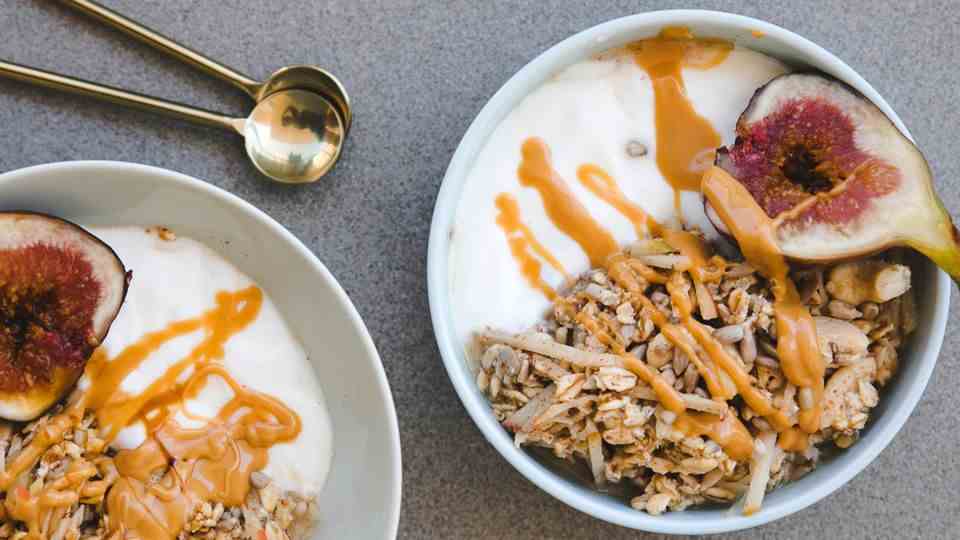Opinion poll
Whether muesli or sausage sandwich: For many Germans, breakfast is the most important meal of the day
Most Germans only have a hearty breakfast at the weekend – during the week most people only have 15 minutes for it.
© Nikada / Getty Images
For older people, the first meal consists more of bread with sausage and filter coffee, while young people rely on muesli and fruit.
Trends such as intermittent fasting without a meal in the morning seem to be irrelevant to most people: Germany is and will remain a country of breakfast eaters – especially hearty breakfast eaters. As a custom, the morning meal is by no means finished with breakfast. On the contrary: for a large majority it is indispensable.
This promotes a representative Survey by the opinion research institute YouGov on behalf of the German Press Agency. Only about every fourteenth adult states that they never eat breakfast. And according to a third, breakfast is even the “most important meal” of the day. Lunch and dinner each have fewer advocates.
Breakfast – hardly anyone skips a meal
Only two percent of young adults, 18 to 24 year olds, say they never eat breakfast. In contrast, eight percent of older people (people over 55 and also 45 to 54 year olds) say they never get anything down in the morning. Older people, if they do, very often have a hearty breakfast – meaning bread with cheese, sausage and so on. 43 percent of those over 55 take this option when it comes to choosing, while only 22 percent of younger people (18 to 24 and 25 to 34 years) do so.
Overall in Germany, the hearty breakfast is ahead with 34 percent, followed by the sweet breakfast with 18 percent (rolls/croissants with jam, etc.) and the breakfast of omnivores with 15 percent (bread, muesli, egg, fruit…). Then come muesli fans (10 percent), egg fans (6 percent) and fruit eaters (5 percent).
The question was asked – with a duty to decide – which type of breakfast “personally liked the most”. The rest didn’t want to choose anything, didn’t specify or claimed they never had breakfast.
Young people prefer muesli and fruit
By the way, young adults choose muesli or fruit for breakfast more often than average. The values for these variants are twice as high for 18 to 24-year-olds as the average for all adults. They also drink more water in the morning instead of coffee. So there seems to be a nutrition-conscious generation growing up that doesn’t stuff its stomach with sausage sandwiches and sometimes incompatible filter coffee.
Overall, however, coffee is far ahead: 66 percent name it as their favorite liquid intake in the morning. Filter coffee is still the most popular (27 percent), followed by coffee from a fully automatic machine (24 percent), a coffee made from pods (9 percent) and espresso (6 percent). The difference in the age groups is striking here, because filter coffee soon seems to be no longer popular: 40 percent of older people (over 55) drink it, but only 5 percent of young people (under 25 years of age). Fully automatic coffee dominates in the middle age groups.

Breakfast – the most important meal of the day
When asked about the “most important meal” of the day, most adults choose breakfast. A third (33 percent) named the morning meal, less than a quarter (23 percent) the lunch. Just as many said all meals are “equally important.” Dinner, or supper, came last at 17 percent, with men (19 percent) finding it slightly more important than women (15 percent). On the other hand, women (34 percent) are more breakfast advocates than men (31 percent).
The popular breakfast is probably taken comparatively hastily. A survey by the food manufacturer Leif last year revealed that the average breakfast time for Germans is said to be just 15 minutes. At lunchtime and in the evening, on the other hand, a majority plan 30 minutes or more.
Apparently, hardly anyone applies the old mealtime adage “In the morning like a king, at noon like a king and in the evening like a pauper” to the duration or context of breakfast, lunch and dinner. Instead, most probably only think of the quantity.
Extensive start to the day only on weekends
Extensive breakfasts are usually only eaten on weekends. Like many things nowadays, the brunch (portmanteau word from the English breakfast and lunch) is willingly prepped. Old wine in new bottles is then, for example, so-called overnight oats (formerly simply pickled oatmeal), porridge (porridge/porridge), granola (crunchy muesli), French toast (poor knight) or smoothies (mixed fruit drink).
There is also more bohei than before about egg dishes. In hip restaurants they are often offered in an Americanized way, think of Eggs Benedict (bread with poached eggs, ham or bacon and rich Hollandaise sauce) or Eggs Florentine (vegetarian: with spinach).
Fruit spreads are also said to be different and modern today – and supposedly better than classic jam or grandma’s marmalade. They are provided with sweeteners and sugar substitutes. In the ZDF documentary “Lege unpacks: Nasty breakfast traps”, however, Britta Schautz from the Berlin consumer center pointed out that the taste would remain the same. “That means: I don’t get used to less sweet products, which would actually be an advantage, because then I eat less sugar in the long term.” Instead, the body learns nothing “and will continue to prefer these very sweet products”.
The perfect winter breakfast
Five warming dishes for the morning
Breakfast beats intermittent fasting
Speaking of sweets, calories, figure: In recent years, intermittent fasting (intermittent fasting) has been very present in the media. With the 16:8 method, for example, either the early or late meal is skipped. Nothing is eaten for 16 hours. If you eat dinner around 8 p.m., you can only eat from 12 p.m. the next day, so skip breakfast. The metabolism should come into a short fast every night. As the current survey shows, many people probably don’t care about this trend at all.
The word breakfast: Historically, “breakfast” is about 600 years old. At that time, the term replaced the Middle High German expression “morning bread”. In English, breakfast is called “breakfast” – and the word describes the breaking of the fast after a night without eating. In Switzerland it is often Zmorge (Duden: “dialectically moved together from: to morning (eaten, to be eaten)”), sometimes also early food or French Dejeuner.

